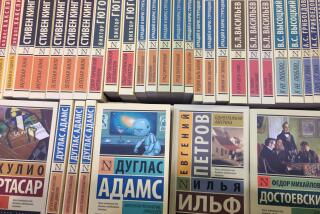Western Press, Government Smear Soviets
- Share via
In the week following the Chernobyl nuclear power plant disaster, the Western press rushed to judgment. Soviet claims of limited deaths were ridiculed; damage to the Soviet economy was supposed to be enormous. What limited information the Soviets did release was said to demonstrate that Soviet leader Mikhail S. Gorbachev’s announced policy of greater openness was a fraud.
Now it increasingly appears that the Soviet version of the events at Chernobyl has been closer to the truth than the original Western stories. And the way the Soviets have been expanding the amount of news indicates that Gorbachev really does have a more open information policy.
We are quick to point out what we see as the failures of the Soviet system. Perhaps our experience in trying to report on Chernobyl will teach us that we should look closer for the realities.
Several years ago, for example, the Western press was filled with stories about meat shortages in Soviet stores. Yet these stories never pointed out that at the time, Soviet per capita meat consumption was still on the same level as that of Britain, that Soviet citizens eat their big meal at noon and that the lunchtime cafeterias always sold meat dishes (or once a week, fish) at low prices. And how often is it reported that per capita meat consumption has been rising rapidly again in the last four years and that meat is quite available again in the stores? Another example, also from several years ago, is the attention the Western press gave to reports of rising infant mortality in the Soviet Union. Scholars are now looking at the data and concluding that the increase never occurred. The Soviet statistics had essentially been falsified under the regime of Nikita S. Khrushchev and a change in reporting procedures had produced the appearance of a rise. Soviet infant mortality today is slightly higher than in the United States, but it has not been increasing drastically.
What has gone wrong?
First, McCarthyism remains strong in the United States on the Soviet question. Soviet-bashing is safe. Favorable stories on the Soviet Union will draw complaints and even charges of pro-Sovietism. It is easy to go down the path of least resistance.
Second, the U.S. government has enormous influence on the American interpretation of the Soviet Union. Scholars receive funding from the government, they are drawn into consultation with the Central Intelligence Agency and must clear their publications on sensitive questions.
Most press stories concerning events in the Soviet Union come from Moscow and the attentive reader will notice how often “diplomatic sources” are cited for interpretation. The job of the diplomat is to represent the interests of the Administration. The diplomat knows that a story presenting the Soviet Union in a favorable light will not get him favorable ratings at home. Correspondents who report the embassy interpretation are essentially reporting the Administration line as objective analysis.
Ultimately, the only solution to the problem is a Soviet information policy that gives correspondents other sources to report and that points them to important statistics and developments. But we too need to be more careful.
For diplomats based in Moscow, it is useful to smear the Soviet Union abroad. They propagandize the correspondents partly so that the stories will come back into the Soviet Union on Western radio. However, we are also propagandizing the American people. The Soviet defense buildup that did not occur from 1975 to 1983 resulted in a doubling of the American debt because of a belief in a “relentless” 5% Soviet increase in arms spending.
Eventually, an Administration can even come to believe its own propaganda. Wanting to protect the United States if Gorbachev does not come to a summit here this year, diplomats put out a line that he will lose face if he does not seek a second session with President Reagan. The Administration, believing that it does “have the Soviet Union on the run,” then begins to think it can push Gorbachev around without suffering any ill consequences.
It is all nonsense. If Gorbachev does not come to a summit, it is because he already has said that there is no use for talks unless the Soviet-American atmosphere is improved and progress has been made on arms control. The signs that the Soviets are shifting from an American-centered to a European-centered foreign policy are multiplying each month. If the United States does not want to deal with Gorbachev, he will find Western European leaders who will.
Just as it was during the Calvin Coolidge and Dwight D. Eisenhower Administrations, America under Ronald Reagan is in a period of illusions about its role in the world and wishful thinking about its prosperity. Unless the Administration changes its confrontational policy and starts making fundamental progress on such important Soviet-American issues as troop reductions in Europe, the bubble may soon burst. But what is the hope of avoiding that when our own information policy toward the Soviet Union is so closed and biased?
More to Read
Sign up for Essential California
The most important California stories and recommendations in your inbox every morning.
You may occasionally receive promotional content from the Los Angeles Times.













